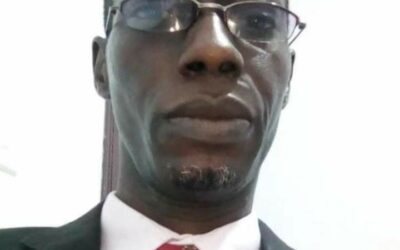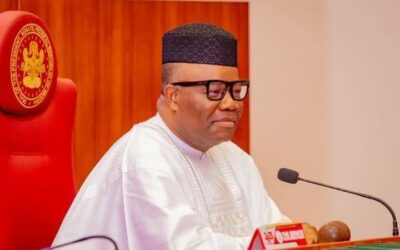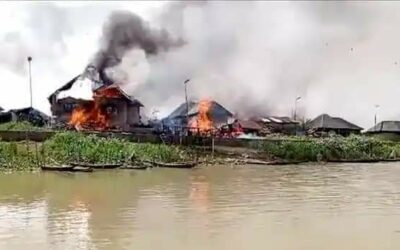Nigeria’s health sector and its appalling inadequacies continue to make perverse headline news. Depending on which of the various public media sources is patronised, it is no longer news that Nigeria’s First Lady has had to pay an urgent, unscheduled visit abroad to treat a condition ranging between a bad case of food poisoning to a ruptured appendix. The nation wishes her speedy recovery from her ailment and a correspondingly speedy return to her home in Nigeria.
In reality, stories of deteriorating injury and needless loss of lives occur in the country on a daily basis at a rate that has been disturbing for several years. In the main, this has been attributable to the dire and abject nature of Nigeria’s health facilities. The atypical conundrum about foreign travel for medical treatment has made its routine appearance, now predictably overtaken by the expected diversion of ostensibly more “important matters”. Lest the key issues become subsumed in the one-dimensional vision that these situations often throw up, health concerns at any level represent the most serious problems that citizenry experience and, certainly, should not be matters that are needlessly politicized. Foreign travel for treatment has become a response – available, indeed to only a very small proportion of the population – that has been so persistently adduced that it obscures the real fact that its outlet as an option has been grossly exaggerated.
It is common understanding that Nigeria has some of the most disturbing health indices for a country of its supposed status in the world. Tedious as this may seem, it is proper to examine some of these to place the situation in graphic context. Numbering approximately 160 Million people, life expectancy at birth is at between 48 to 55 years for men and women respectively, bettered by countries like Chad, Malawi, Senegal, Guinea, Ghana and Bangladesh, all countries poorer than us. Maternal mortality is at 545 per 100,000 births; Infant Mortality at 75 per 1,000 births; Crude Death Rate is 14 deaths per 1,000; 23% of children under 5 are underweight for their age; 41% of children are immunized against measles and the HIV prevalence rate is now approximately 4.1%. Those, largely, skirt around the mortal situations. Nigeria is a haven for a frightening array of major infectious diseases including bacterial diarrhea, Hepatitis A and E; Typhoid, Yellow, Dengue and Lassa Fevers; Malaria, Meningitis, even Rabies and Japanese Encephalitis!
Examining some of the reasons for the poor state of Nigeria’s health facilities presents reactions of interest. At a recent meeting of the Association of Nigerian Physicians in the Americas at which some of Nigeria’s most accomplished medical minds shared their views, some of the reasons offered ranged from huge underfunding of the sector; absence of the ubiquitous and elusive “political will”; state and even privately funded foreign travel for treatment; corruption; decadent infrastructure; unavailability of power and its effect on commercial interventions; poor implementation of strategic plans developed over the years and so on. On its face, these, and more, represent real reasons for the failure of our health structures and systems in Nigeria. Indeed the existence of these considerable difficulties will cripple even the most sophisticated and effective health delivery systems in the world. These provide us with a convenient outlet to sidestep and ignore probably one of the single biggest reasons why this situation has occurred and subsists.
These scandalous conditions did not occur overnight. Ours is a product of years of “heavy duty” decay, encouraged by unmitigated indifference. The deterioration ossified so aggressively that most people under the age of 40 probably have no recollection of any era when medical service delivery bore the semblance of being clean, competent and available. It is a myth that people who were ill were, once, actually generally properly diagnosed and treated without the kind of lottery-type speculation that diagnosis now appears to portend. Medical professionals, by their large numbers, now generally appear, sound, look and act with such lack of knowledge and competence that patients are left with the additional illness of corroded confidence! Medical administrators offer cocktails of these oft-touted reasons as excuses for bewildering levels of incompetence, obnoxiousness and dereliction of all kinds of professional duties.
But the biggest – indeed – largest constituency of culprits is us Nigerians, especially the incongruously described middle class and elite. We have, over the years, produced the leadership that has exacerbated this problem since independence. We have, collectively, treated our health and its protection with crass abandon. By permitting leadership to treat our health as a secondary issue, we stand embarrassingly guilty of the most abject form of abdication of responsibility. In our pursuit of life’s comforts and pleasures, we have mortgaged they very ingredient necessary to permit a wholesale enjoyment of those attainments – life itself. Nigerians are collectively responsible for allowing our leaders fail to make the provision of health the primary entry point for the right to lead us. We have done this by an indifference that is both repulsive and preposterous. Those in good health believe that it is not their problem. Those for whom these concerns arise who can afford to utilize their ability to purchase medical treatment elsewhere use that as an incomprehensible alibi to taking responsibility.
We Nigerians remain, regretfully, driving-seat architects of our own distressing misfortune. We have permitted profound indifference and an atmosphere of abandon and neglect that has cheapened human lives. We have afforded our leadership the right to treat us like livestock. Our perception, in this respect, of what is right and important has been so badly distorted by this gross dereliction that it will take years of actual, conscious and direct orientation to even stimulate a response never mind a reversal. In the intervening period, these needless accelerated fatalities will continue, unabated.
Contrast this position with what happens in those countries that Nigeria has tried to ape since its birth. The United States goes to the electoral polls in November 2012. Alongside if not above the unemployment and the economy, the Affordable Care Act (commonly referred to as ObamaCare) is the single most important electoral issue. In simple terms, it is President Barack Obama’s reform initiative designed to expand health insurance to around 30 of the 50 million Americans without coverage. It compels people who can afford health insurance to buy it, forcing younger and healthier people into the market, theoretically driving down insurance premiums for all. This law precludes insurance companies from discriminating against people with pre-existing health conditions and allows young people to stay on their parents’ health care up to the age of 26. It also extends Medicaid, the government programme to provide health coverage to the very poor. The US Supreme Court only stopped Federal Government from threatening the states into accepting new Medicaid funding. Welcome by the population that it covers, it is derided by its opponents and big insurance business. But the involvement of the American populace is so considerable that its vast people have a say, one way or another, in its application. As they also do with other aspects of healthcare. That is, in all respects, taking ownership of the right to affordable medical care and, by extension, the right to live and life itself. The US election may, it seems, turn on the reception and appreciation of ObamaCare.
That said, there have been attempts – minimal in size to the actual problem – to address some of these deficits. One visible attempt, surprisingly, is the outstanding Delta State example of its Teaching Hospital. Ostensibly conceived by its now chastened governor, James Ibori, it may yet remain this entire democratic dispensation’s most beneficial legacy to Delta’s long-suffering people. Consider how significant this would have been if replicated in a number of other states across the country.
It is scandalous that our facilities are as poor and unsatisfactory as they are. Lest medical professionals start to form a queue with the much-rehearsed defences, this position is not about individual accomplishments. There will always be a minority who continue to exert and assert themselves creditably despite significant challenges but the reality, unmistakably, remains that the single most influential agent of change will be the Nigerian people. The starting point must be to accept that, collectively, we Nigerians are responsible for the mess. Second, we must articulate a desire to bring about change. Leadership must be harried into greater accountability at every level of government because, morally and statutorily, all three tires of Government in Nigeria have a duty and responsibility to deliver good health at all levels. Actionable Patient’s Charters must be developed, publicized and Nigerians encouraged to enforce their rights within this framework. The regulatory aspects of medical service delivery – this being the consistently failing engine room of this sector – -must be prioritized with medical professionals being required to raise performance standards. All these must form the basis of publicized monitoring across the country as a whole. In this regard, it seems most ironic that Civil Society and Labour organisations can muster momentum that effectively cripples the country over fuel price increase yet they have kept inexplicably mum as Nigerians receive unsatisfactory medical treatment. There are many, many more suggestions. Whatever these are, we need to make a start as a nation. Nigerians are dying needlessly from this neglect. This trend must stop. Whilst the majority have been victims of this communal ineptitude, it is important to expand the obligation of accountability to include those to whom the duty is owed. Nigerians as victims of this diminishing expectation should be driven, encouraged and directed to assume, urgently, less of a victim’s demeanour and more of an enforcer’s disposition.
ANDREW OBINNA ONYEARU
writes from Abuja, Nigeria



